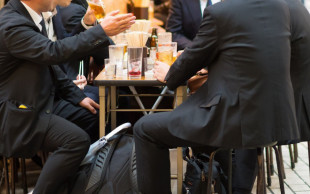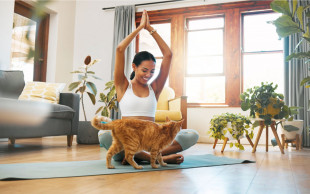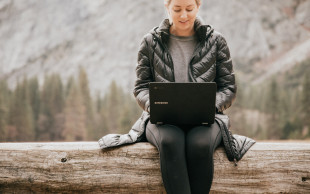STYLEGUIDE takes a glimpse into the varied life and passion of freelance musician Edwin Toh, from playing at live music venues to teaching workshops and working on music production projects.
How did you get started initially and what inspired you to do what you do?
Music has always been a part of my life since I was young. My journey in music began at the tender age of four when I started classes at Yamaha Music School, which sharpened my aural skills and broadened my appreciation for different genres and styles of music.
Years later, having decided to pursue music as a career, I enrolled into the pioneer batch of Singapore Polytechnic's new Diploma in Music and Audio Technology (DMAT), a course that really piqued my interest. That was the starting point from which I decided that music would be my career, because it was my passion, and because I didn't really have expertise in anything else. I subsequently completed my Bachelor of Music degree at the renowned Berklee College of Music in Boston, USA.
Back in those days, I guess my inspiration for music as a career banked on being exposed to a lot of classic songs, as well as being actively involved in musical activities in school.
What challenges did you face when you started on your music career?
Back then for my relatives, some of them thought I was a bit "siao", because the traditional view of music - and I'll broaden it to the arts in general - would be that it's not financially sustainable. Also, socio-economically speaking, it does not contribute to society as much as say a banking or law career would.
The past three years of freelancing have proved to my friends and relatives that I made the right choice. Even though a career in music might not be mainstream, it is still a valued profession that has a place in society, be it in music education or performance or music production.
I just carried on with whatever I did. I guess I'm stubbornly passionate, so I still barged on anyhow.
What challenges do you face as a freelance musician?
The first challenge would be working solo – managing the workload and schedule all by myself. As a sole proprietor, I appreciate the freedom and autonomy to work wherever, whenever. However, when the workload gets heavy, it's not always possible to find an assistant with the appropriate level of commitment, time, expertise, or hiring rate.
Another challenge would be the opportunity and travel costs of wandering around due to the flexible nature of my work. I could technically work remotely on a music production project (as long as I have my laptop and musical equipment), but most other work requires physical presence, whether it's teaching or performing.
Frankly, when I first started out on the freelance route three years ago, I did have doubts on whether it would be financially sustainable. There was a point where I almost wanted to switch to a full-time job for something more stable. It's not until recently that my career and workload picked up, to the point that I work pretty much everyday now. I’m grateful to be able to do what I love for a living.
What would you say is your purpose in life?
I aspire to live freely, love wildly, and experience life with no regrets. As a performing musician, my purpose in life is to inspire and encourage others through music. To that end, music education is important to me as well, whether it be inspiring students to pursue music studies or as a sideline hobby that helps to cultivate their mental focus and motor skills.
What will you say to encourage students to pursue music?
I would admit that it's not an easy path, but if they have the drive and determination to press forward and the aptitude for self-directed learning, I believe that music would not just be a fulfilling but also financially sustainable career as well.
What is the change or impact that you want to make in this world?
Well, I would localise it to Singapore first. In general, I feel that we do not emphasise or treasure music as much as it should be yet. For instance, the level of appreciation and awareness that most people have towards local music is growing but remains pretty much cynical.
The NAC (National Arts Council), Esplanade and others are indeed doing much more to help, broadening society's appreciation of music through having heartland performances et cetera, but the challenge would be to really change society’s attitude towards musicians in Singapore – to change it such that it will not be viewed as “just another retirement or busking job".
I would want to change the negative connotation associated with music to an improved perception of “a viable career that is respected and admired as much as other jobs”.
I find that society’s understanding of the scope of the music industry is often superficial – seeing only the “front-end” jobs like that of a performing artiste. There are actually many essential roles behind the scenes – whether it's music arrangement or composition or songwriting, the people involved here are usually working in private away from the limelight. It would be great if the “back-end” side of the music industry could be more exposed to everyone to broaden their awareness of the industry.
Do you see society's perception of music gradually changing for the better?
Definitely, I would say that we are opening up to local music gradually. We see that the number of local acts that have performed in both local and international festivals have increased, but I think we can still do better.
However, there remains that systemic issue of comparing local music to international music. We're comparing different markets, and a lot of times when we're talking about music, it's also not just the artistic side that matters, but also the business side (financial support and funding) that determines how successful an artist would be in music.
How should people in general look at local artistes relative to international artistes?
I think we can still look at local artistes as having a similar style as international artistes, just that it’s with a local flavour, a different take on things.
We don’t necessarily have to emulate international music, it's good that we do so but by having something different, that would set us apart as Singaporean music i guess - a Singaporean brand of music.
Where do you get your ideas from in creating your music?
It can be a challenge to find Lady Muse these days, especially when she's flying around and with the proliferation of great music everywhere. I usually get my best musical ideas at night when I'm most relaxed, preferably in a quiet environment where I can be alone and focused with my thoughts.
People sometimes get their ideas by listening to music, but as a musician sometimes all you need, ironically, is silence – not that I don’t get any ideas from listening to music out there. I find that Lady Muse tends to drop by when my mind is relaxed and perceptive.
Can you share your greatest inspiration/motivation in life?
My greatest inspiration in life is music. Being able to connect to that intangible, hidden dimension of music is really one of the wonders of being human, with songs to encourage and celebrate every stage of life.
Can you tell us more about this hidden dimension of music?
You know that indescribable feeling you get when you listen to a song? Or a tune playing in the background that coincidentally matches your emotion at that particular moment in time – whether it's joy, sadness, or anger. Music may enhance or subdue that particular emotion you're feeling – that’s the hidden intangible power of music.
I find that music does not necessarily need to be organised and in a "beautiful" form, as long as it serves its purpose in honestly conveying the particular emotion that is involved. The hidden power of music is apparent especially when paired with visual media – try watching a movie with only spoken dialogue and no sound effects or music – it wouldn’t be as interesting.
What do you do to recharge when you're feeling drained?
When I'm feeling drained, I explore the world to relax and recharge. My freelancing work already involves a great amount of local travel around Singapore, but that has ironically spurred me to travel even more abroad.
Extensive travel trips I've taken in the past (both for work and for leisure) include a coast-to-coast trip in the USA and adventures in 15 other countries. Amid the current peak season of work, I’m looking forward to my next major break in 2018 – backpacking across Europe!
What does success mean to you and what is the greatest success you've experienced?
Success as a musician, for me, is not so much about the fame and fortune as compared to the people around me that I have inspired or influenced for the better through music.
The greatest successes I've experienced so far in my career as a musician would be playing for talented artistes such as Kelly Poon, Allan Moo, Ruth Miaoru, and Tay Kexin as well as comfortably maintaining a career as a freelance musician.
What would you say was the single most influential factor in your success?
I would sum it up in one word, "grit" – being persistent and passionate in my pursuit of music while sacrificing or toning down in some other areas of life.
This has enabled me to cross new boundaries in the sense that I've taken on a variety of projects in the past three years in music performance, education and music production.
What would your ideal lifestyle be like in 1 year / 5 years / 10 years? What's your dream lifestyle like?
In a sense, I'm already living by Confucius’s advice: “Choose a job you love, and you will never have to work a day in your life.”
In 1 to 5 years, I still see myself freelancing and finding joy in making, teaching, and producing music.
10 years and further into the future, my ideal life would be one combining my two greatest passions in life – music and travel.
If you could give your younger self one piece of advice what would it be?
A piece of advice I would give not just to my younger self, but to students and aspiring musicians as well, would be to treasure time and take more risks. It's not often till we are older that we actually look back and realise that our youthful days might have been spent on something more productive, or that we had a hidden passion we never got to pursue.
Stepping outside your comfort zone while you are young and have fewer responsibilities would be something your future self would be grateful for.
What are your hopes and aspirations for the future?
I'm hoping to be a freelancer for as long as I can because I treasure freedom and flexibility. A longer-term aspiration would be to work less and live life more.
To that end, I prioritise the continual upgrading of my skillset, whether that means keeping my repertoire updated with current songs and styles of music or learning my way around the latest music technology.
In the words of American composer Roy Ayers, “The true beauty of music is that it connects people. It carries a message, and we, the musicians, are the messengers.” I look forward to brightening someone’s day through music, in my own little way.
Find out more about Edwin Toh at www.edwintohmusic.com
For more fascinating stories & articles, like us on Facebook and follow us on our Instagram @styleguidesg.
















